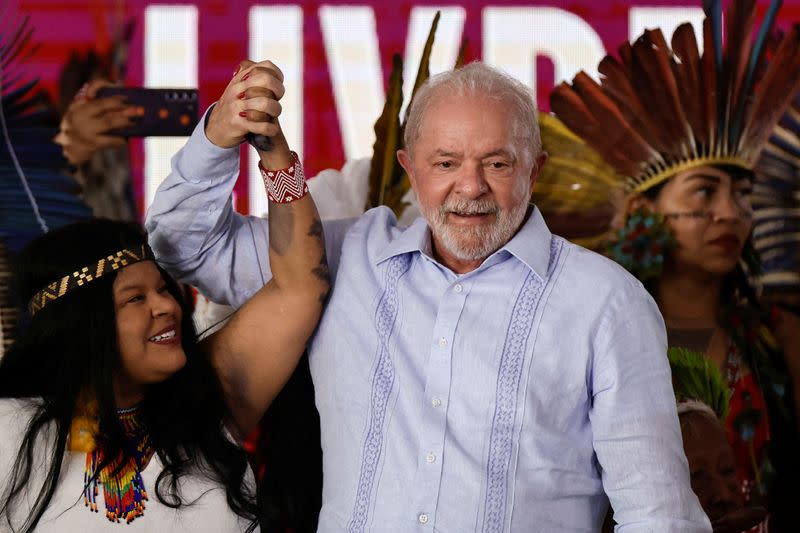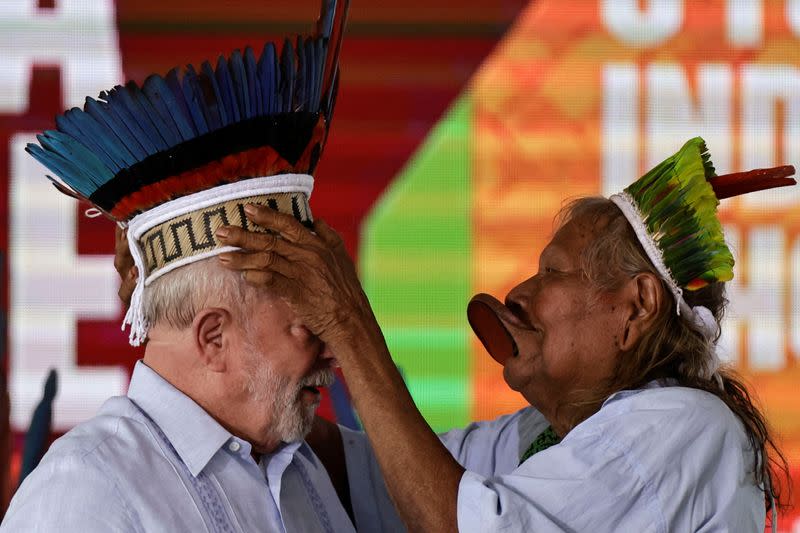Brazil's Lula recognizes Indigenous territories halted by Bolsonaro
By Anthony Boadle
BRASILIA (Reuters) - President Luiz Inacio Lula da Silva legally recognized six Indigenous territories on Friday, fulfilling a campaign promise to reverse the policy of his far-right predecessor Jair Bolsonaro said Brazil's original people had too much land.
The recognition is crucial to protect Indigenous lands from increasing encroachment by farming and invasions by gold miners and loggers in the Amazon rainforest.
They are the first territories to be effectively recognized by the state since 2016, as one recognition in 2018 was overturned later by a court.
Lula signed the titles at an annual meeting in Brasilia of representatives of Brazil's one million Indigenous people. The Free Land Camp is a five-day event featuring music, dance and food in tents erected on the grass esplanade of the capital.
Chief Raoni, who became a global reference in the 1990s for his environmental campaigning with musician Sting, placed a headdress of blue, black and red bird feather on Lula's head, as the crowd cheered the leftist president.
"I won't leave a single Indigenous territory unprotected," Lula said.
Indigenous leaders called on him to speed up the recognition of some 300 Indigenous territories that have been mapped out but have waited for years to be formally recognized.
Former President Bolsonaro, who was backed by Brazil's agricultural sector and its powerful farm lobby, vowed publicly never to allow "one more centimeter" of land for reservations, saying Indigenous people had too much land for so few people.
Some 300 different ethnic groups live on 730 territories across Brazil that they consider ancestral lands, mainly in the Amazon rainforest, totaling 13% of the country's land, but only 434 have been officially recognized.
Farm sector representatives in Congress are currently calling for the passage of legislation that would set a cut-off date for reservations that were not occupied at the time Brazil's current constitution was enacted in 1988.
That deadline would leave tens of thousands of Indigenous people without the protection of their land conferred by reservation status land. The measure is also being debated by the country's Supreme Court which is expected to rule in July.
With no state protection, Indigenous communities are in danger of invasions by illegal loggers and wildcat gold miners that surged under Bolsonaro. He wanted to allow commercial agriculture and mining even on recognized reservations.
Bolsonaro gutted the government's Indigenous affairs agency Funai, which began to work for non-Indigenous interests in land conflicts, anthropologists and community leaders said.
Lula created a Ministry of Indigenous People on his first day in office in January and named Sonia Guajajara, the leader of the main Indigenous umbrella organization APIB, to head it.
By keeping his promise, Lula is showing the world he intends to strengthen the rights of Indigenous people and protect the forest, said Toerris Jaeger, head of the environmental NGO Rainforest Foundation Norway.
"Indigenous areas are crucial to preserving the Amazon, the world’s central bank for biological diversity ... Indigenous people are the ones best able to guard this wealth," he said.
(Reporting by Anthony Boadle and Isadora Machado; Editing by Frances Kerry and Aurora Ellis)





